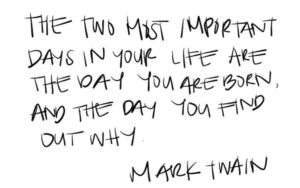Having purpose in life refers to being dedicated to a cause that is bigger than you. One that you will never fully attain in a lifetime. Whereas goals are specific, measurable and have a deadline, purpose is general in nature, a way of living as opposed to a means of achieving. Goals provide the what, how and when. Purpose provides the why.
Purpose brings meaning to life – reason for getting up in the morning and tackling each day with enthusiasm. It provides the standards by which we live and the motivation for what we do.
Can work be a purpose? Probably. But when work ends, then what? People who retire to nothing usually end up dying earlier and becoming ill more often than those who give up their jobs, but not their purpose in life.
Leider, in his book, Power of Purpose, relates a survey conducted at an American university where 60 students were asked why they had attempted suicide. 85 percent replied that life seemed meaningless. And surprisingly “93 percent of these students, suffering from the apparent lack of purpose in their lives were socially active, achieving academically, and on good terms with their family situation.”
It’s not so much what we do, but why we do it that will give us an insight into our purpose. What are our values? What really matters to us? What is our belief system? Do we feel strongly about some aspect of life, the world, the environment, people? What determines our behavior? What makes us angry, sad, or happy? What moves us emotionally? Purpose comes from within us, and we must dig deeply sometimes to find it.
Once we know our purpose in life, we should express it as a personal mission statement. Then, any goals we set must be compatible with our purpose. Our walk will reflect our talk. Nothing is more stressful than pursuing goals that conflict with our purpose. We must be at peace with ourselves. What we accomplish through goals is not as important as what we become. If we are forced or force ourselves to work on goals that are incompatible with our purpose, we become emotionally upset. According to Andrew Matthews, author of the book, Being Happy, emotional upsets produce powerful and lethal toxins. To quote, “Blood samples taken from persons experiencing intense fear or anger when injected into guinea pigs have killed them in less than two minutes. Imagine what these toxins can do to your own body.”
When we work on goals or activities that reflect our values and purpose in life, we have fewer anxieties and a greater sense of success and happiness.
But how do we go about defining our purpose or mission in life? Perhaps a good start would be to jot down some of your beliefs and feelings on paper. Roger A. Merrill, author of Connections Quadrant II Time Management, suggested that developing a mission statement is a process that takes time. Writing a rough draft and carrying it with you, making additions and deletions as you go along, will eventually result in a brief statement that reflects your own values.
It might end up stating “to elicit growth and change in the lives of those I meet” or “to look upon everyone with love” or “to become more Christ like”. It could be longer. A. Roger Merrill suggests that a personal mission statement should contain three basic elements:
- What you want to be.
- What you want to do or accomplish.
- The values and principles upon which your being and doing are based.
I find that once you know what you want to do, it usually involves other people, so I express my mission as what I will do for other people, how I will do it, and my reason for doing it. The important thing is that it reflects your values, what you consider to be important. As Victor Frankl, survivor of a concentration camp, has often been quoted, “Life asks of every individual a contribution, and it is up to that individual to discover what it should be.”



Recent Comments